not a saint. just trying to motivate myself to do well. x. oop. danielle.
Don't wanna be here? Send us removal request.
Text
Negations 101
I don’t like cheese - Je n’aime pas le fromage
I don’t like cheese anymore - Je n’aime plus le fromage
I’ve never liked cheese - Je n’ai jamais aimé le fromage
I don't like cheese yet - Je n'aime pas encore le fromage
I still don't like cheese - Je n'aime toujours pas le fromage
I don't like cheese that much - Je n'aime pas tant que ça le fromage
I don't necessarily like cheese - Je n'aime pas forcément le fromage
(I only like cheese) - Je n’aime que le fromage
I don’t like cheese nor bread - Je n’aime ni le fromage ni le pain
None of my friends like cheese - Aucun de mes amis n’aime le fromage
I like no one - Je n’aime personne
I like nothing - Je n’aime rien
He is nowhere - Il n’est nulle part
There���s nothing to do - Il n’y a rien à faire
I don’t see anyone - Je ne vois personne
I can't see him - Je n'arrive pas à le voir**
I see no solution - Je ne vois aucune solution
I never do anything - Je ne fais jamais rien
Don’t go! - Ne pars* pas / Ne partez pas
Don’t go there! - N’y va pas
*We use Partir rather than Aller which is a transitive verb i.e. requires an object (I'm leaving is an acceptable sentence but I'm going is considered unfinished).
**We don't use Pouvoir (to be able to) as it would refer to one's physical ability to see. My eyes are functional, I just can't spot people.
Learn more about "Ne".

523 notes
·
View notes
Text

12.4.2021
i started reading the shadow of the wind last night and i have become immersed into this magical world
my instagram
1K notes
·
View notes
Note
Bonjour! I would like to have better conversational skills. Could you teach us some reaction words like "really?", "no way" etc that would sound natural in French? Thanks!
Hello,
Expressing surprise:
Vraiment? - regular to formal
Tu plaisantes? - regular to formal
Sérieusement?- regular
Sérieux? - casual
Tu déconnes? - casual
Oh putain! - casual/sweary
Expressing incredulity:
Je n'arrive pas à y croire - regular
Je ne peux pas y croire - regular
C'est pas croyable - regular to casual
C'est pas possible - regular to casual
*gasp* Mythooo! - casual (usually happy context)
Ah bah merde alors! - casual/sweary (usually situation neutral or bad)
Expressing ignorance:
(Je n'en ai) aucune idée - regular to formal
Je ne sais pas du tout - regular
Bonne question! - casual
Alors là! - casual
Va/Allez savoir - casual
*blowing a strawberry* - casual
Expressing refusal:
Hors de question - formal
Absolument pas - regular to formal
Pas question - regular
Y'a pas moyen - casual
Non mais ça va pas, non?! - casual
Mais t'es cinglé/fou/marteau non? - casual/sweary
Hope this helps! x
539 notes
·
View notes
Text
Crafting a language self-learning curriculum (sort of)
In my experience textbooks aren’t really the best way to learn after you’ve passed a certain level. They’re incredibly useful for beginners to learn grammar and vocab but after that they don’t offer a lot of activities that help you implement your learning in a way that reflects how you will actually use it.
It’s also near impossible to learn a language without help. Don’t isolate yourself just because you are self-learning rather than taking lessons. You NEED to talk to native speakers, both through text messages and actual verbal conversations. Colloquial conversations will differ greatly to formal an ‘correct’ ones spoken in a classroom.
1. The first step I suggest when creating a curriculum is to know what your goal is. Are you planning to move to the country the language is spoken in? Do you want to study as a way to better understand and appreciate the culture?
2. The next would be to gauge what level you are at through taking a language competency test. This is mostly so you have an idea of what you do know and what is considered the universal “next step” to give yourself a general direction to head towards.
3. Write down topics that interest you. For me these would be my career (marketing and digital media), my interests (video games, ttrpgs, fashion, history, horror novels), and important parts of my identity (my religion, my sexuality, my partner, my disability) etc. I didn’t bother writing down anything I already know such as how to talk about my family, how to talk about my country of birth, or hobbies commonly written in textbooks such as reading, swimming, camping.
4. Now come up with a list of general activities to cover your listening, writing, reading and speaking skills. Some examples are listed below:
Listening:
Watch 5 minutes of the news - recaps or weekly rundowns are great for this
Listen to an audio book for half an hour whilst cooking, cleaning, commuting etc.
Create playlists of music you actually like in your target language - you can further this by watching interviews about the artists or watching any live performances/streams they have done.
Writing:
Write 1-2 paragraphs about a chosen topic without any dictionary or vocab list aid, any words you cannot remember or do not know just write in your native language. Return with a dictionary to fill in these missing words after and ask a native speaker to make any corrections they can spot and finally rewrite everything with all the corrections (taken from Lindie Botes).
Write practice professional emails, blog-posts, product reviews, leave comments under Instagram posts etc. Make sure to learn how to write in different situations: how does writing an email to your boss differ from writing to your colleague? How are businesses addressed on review sites? What changes when writing a blog for fashion from one about politics? Learn these nuances.
Text your native speaker friends - simple but necessary
Reading:
Read and summarise a key news article from this week
Read a page from a book in your target language, highlight any unknown words to return to. Write out the sentences these words occurred in then the words on their own with their definition and create a new sentence using them. My key tip for this is not to be too ambitious with what you are reading. Don’t try to read an epic fantasy, instead focus on short stories and books for children aged around 5-10. As you improve you can read more complicated plots but just because you are familiar with the book in your native language does not mean you will understand what is going on.
Speaking
Record yourself leaving fake voice mails. This can be for a doctor’s appointment, inquiring about a job, asking to hangout with a friend etc. Keep it short and tone appropriate. This also gives you the opportunity to research phone etiquette in that culture.
Talk. To. Native. Speakers.
5. Combine your topics of interest with activities to give you something that should resemble almost a lesson plan.
Example:

337 notes
·
View notes
Text
Ten bug-related expressions
Avoir le bourdon (having the bumblebee): being sad
Avoir le cafard (having the cockroach): being depressed
Avoir des fourmis (having ants): having pins and needles
Avoir une araignée au plafond (having a spider on the ceiling): being crazy
Un sac à puces (a bag of fleas): a dog
Prendre la mouche (taking the fly): getting upset, annoyed
Un travail de fourmi (an ant’s work): a painstaking job
Moche comme un pou (ugly as a louse): super ugly
Nu-e comme un ver (naked like a worm): completely naked
Des pattes de mouche (flys paws): an illegible handwriting

504 notes
·
View notes
Text
Five words to know
D'affilée - In a row: J'ai couru cinq kilomètres d'affilée
Attention - Watch out!: Attention, andouille, tu vas te blesser
Nul-le - Bad, trash: Ce film est complètement nul! (casual)
Bref - Anyway/In short: Enfin bref, c'est mal parti
Suffire (impersonal) - All that's needed: Il suffit que tu partes à l'heure

272 notes
·
View notes
Text
Books for beginners
L'Etranger - Albert Camus, 1942
Aujourd'hui, maman est morte. Ou peut-être hier, je ne sais pas. J'ai reçu un télégramme de l'asile : « Mère décédée. Enterrement demain. Sentiments distingués. » Cela ne veut rien dire. C'était peut-être hier. L'asile de vieillards est à Marengo, à quatre-vingts kilomètres d'Alger. Je prendrai l'autobus à deux heures et j'arriverai dans l'après-midi. Ainsi, je pourrai veiller et je rentrerai demain soir.
*
Le Petit Prince - Antoine de Saint-Exupéry, 1943
Lorsque j'avais six ans j'ai vu, une fois, une magnifique image, dans un livre sur la Forêt Vierge qui s'appelait "Histoires Vécues". Ça représentait un serpent boa qui avalait un fauve. Voilà la copie du dessin. On disait dans le livre :"Les serpents boas avalent leur proie tout entière, sans la mâcher. Ensuite ils ne peuvent plus bouger et ils dorment pendant les six mois de leur digestion."
*
Candide - Voltaire, 1759
Il y avait en Westphalie, dans le château de M. le baron de Thunder-ten-tronckh, un jeune garçon à qui la nature avait donné les mœurs les plus douces. Sa physionomie annonçait son âme. Il avait le jugement assez droit, avec l'esprit le plus simple; c'est, je crois, pour cette raison qu'on le nommait Candide. Les anciens domestiques de la maison soupçonnaient qu'il était fils de la sœur de monsieur le baron et d'un bon et honnête gentilhomme du voisinage, que cette demoiselle ne voulut jamais épouser parce qu'il n'avait pu prouver que soixante et onze quartiers, et que le reste de son arbre généalogique avait été perdu par l'injure du temps.
*
Sept jours pour une éternité - Marc Lévy, 2007 (slushy)
Allongé sur son lit, Lucas regarda la petite diode de son beeper qui clignotait frénétiquement. Il referma son livre et le posa juste à côté de lui, ravi. C'était la troisième fois en quarante-huit heures qu'il relisait cette histoire et de mémoire d'enfer aucune lecture ne l'avait autant régalé. Il caressa la couverture du bout du doigt. Ce dénommé Hilton était en passe de devenir son auteur culte.
*
La Belle et la Bête - Jeanne de Beaumont, 1757 (tale)
Il y avait une fois un marchand qui était extrêmement riche ; il avait six enfants, trois garçons et trois filles, et, comme ce marchand était un homme d’esprit, il n’épargna rien pour l’éducation de ses enfants et leur donna toutes sortes de maîtres. Ses filles étaient très belles, mais la cadette surtout se faisait admirer, et on ne l’appelait, quand elle était petite, que la Belle Enfant, en sorte que le nom lui en resta, ce qui donna beaucoup de jalousie à ses sœurs.
*
Barbe-bleue - Charles Perrault, 1697 (tale)
Il était une fois un homme qui avait de belles maisons à la ville et à la campagne, de la vaisselle d’or et d’argent, des meubles en broderie, des carrosses tout dorés. Mais, par malheur, cet homme avait la barbe bleue : cela le rendait si laid et si terrible, qu’il n’était ni femme ni fille qui ne s’enfuît de devant lui. Une de ses voisines, dame de qualité, avait deux filles parfaitement belles. Il lui en demanda une en mariage, en lui laissant le choix de celle qu’elle voudrait lui donner.
*
La Cantatrice chauve - Eugène Ionesco, 1950 (absurd)
SCÈNE I
Intérieur bourgeois anglais, avec des fauteuils anglais. Soirée anglaise. M. SMITH, Anglais, dans son fauteuil et ses pantoufles anglais, fume sa pipe anglaise et lit un journal anglais, près d’un feu anglais. Il a des lunettes anglaises, une petite moustache grise, anglaise. À côté de lui, dans un autre fauteuil anglais, Mme SMITH, Anglaise, raccommode des chaussettes anglaises. Un long moment de silence anglais. La pendule anglaise frappe dix-sept coups anglais.
Mme. SMITH
Tiens, il est neuf heures. Nous avons mangé de la soupe, du poisson, des pommes de terre au lard, de la salade anglaise. Les enfants ont bu de l’eau anglaise. Nous avons bien mangé, ce soir. C’est parce que nous habitons dans les environs de Londres et que notre nom est SMITH.

2K notes
·
View notes
Text

this weekend is a writing-heavy one: tackling essays, both academic and personal
3K notes
·
View notes
Text

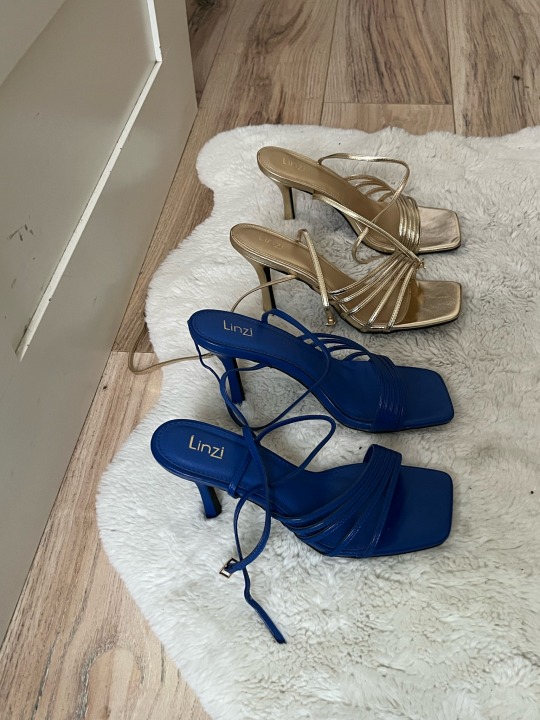
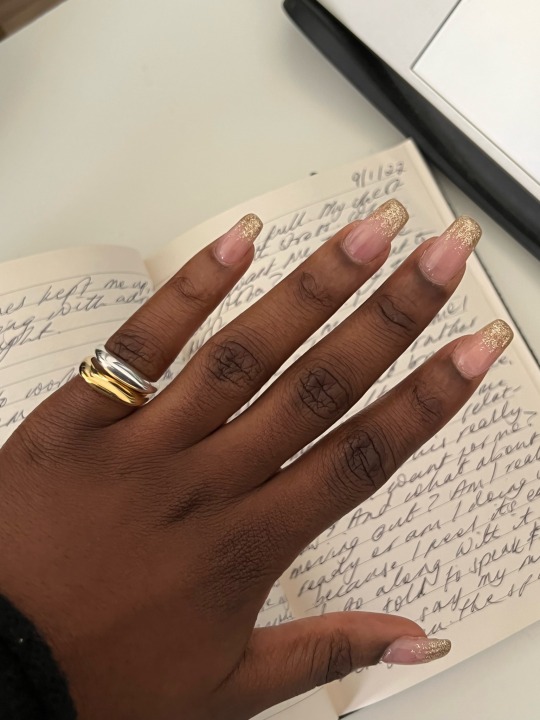

1.2.22
Finally graduating tomorrow after a year and a half of finishing my degree.
(Clearing out drafts - 21/3/22)
295 notes
·
View notes
Photo
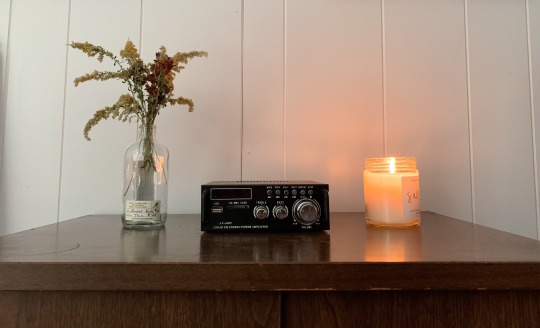
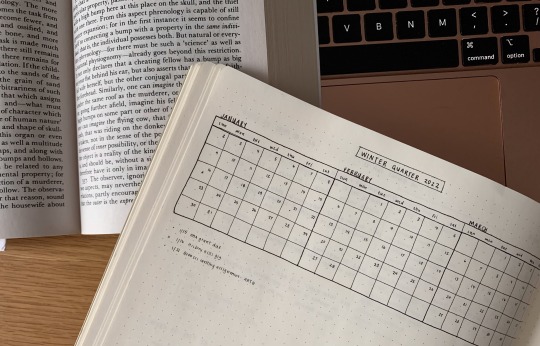
1. 17. 21 //
Nothing warms the room like a candle on a snowy day
3K notes
·
View notes
Note
Bonjour maman,
I was learning French via Duolingo for almost 18 months, and I think u have a comfortable grasp on basic concepts. The thing is, I do not feel that Duolingo is compatible for me. Can you tell me how long does it take to learn it by immersion? (I am a High school student from India and I rarely have time). Do you think that I can learn French by watching french captioned English shows or vice versa?? Or if it will not go well with my shedule, can you suggest alternatives??
+ Hey can you plz suggest some good free French sources. And any tips on how to learn French fast and go from A1 to B2?
Hello dear,
It is a complicated question that doesn't have a single answer as I don't know how your brain works, what will make information stick or not, or the level you currently have. But!
When I work with someone, I have them focus on reading first. I'll have them read newspapers articles, children's books, headlines, tweets, etc. until they get very comfortable with French syntax, extra words, and vocabulary and conjugation. I don't bother speaking French or hyper-focusing on pronunciation for months.
French and English are very different and we would rarely be able to translate a sentence word by word and have it still make sense in the other language. So I don't think going for movies or shows is the right move now because you will have no idea what's going on, you don't have enough knowledge to be able to understand jokes, etc. and you' will get disappointed in yourself and frustrated.
What you should do:
Learn the conjugation of the indicative present, perfect (passé composé), imperfect, simple future, present conditional and subjunctive, for Être, Avoir, Faire, Devoir + Aimer (1st group) and Finir (2nd group) and bookmark the website to check out irregular past participles when you need them Read every day a newspapers article made for kids
Take two hours a week to research a fandom (read fanfiction?)
Make your to-do lists and have a diary in French
Read very young children's books with a dictionary
Social media, social media, social media (Reddit?)
Change the language of your tech
Sign up for newsletters
Sing old slow songs (Piaf, Brel, Barbara come to mind, switch to Aznavour, Joe Dassin or Céline Dion when you get better)
Pick a children's book, get the corresponding audiobook, listen as you read, record yourself and listen
Learn words every week: get a little notebook, one theme per page, make fr/en columns, hide one, recite the other
Listen to TED talks with the captions on
Check out my Google drive (cf. pinned post) and find a book you already know pretty well in its original language and read one chapter every week - not more, you'd get disgusted
Join the Discord fam!
Try out French recipes?
Hope this helps! x
461 notes
·
View notes
Text
Books for beginners
L'Etranger - Albert Camus, 1942
Aujourd'hui, maman est morte. Ou peut-être hier, je ne sais pas. J'ai reçu un télégramme de l'asile : « Mère décédée. Enterrement demain. Sentiments distingués. » Cela ne veut rien dire. C'était peut-être hier. L'asile de vieillards est à Marengo, à quatre-vingts kilomètres d'Alger. Je prendrai l'autobus à deux heures et j'arriverai dans l'après-midi. Ainsi, je pourrai veiller et je rentrerai demain soir.
*
Le Petit Prince - Antoine de Saint-Exupéry, 1943
Lorsque j'avais six ans j'ai vu, une fois, une magnifique image, dans un livre sur la Forêt Vierge qui s'appelait "Histoires Vécues". Ça représentait un serpent boa qui avalait un fauve. Voilà la copie du dessin. On disait dans le livre :"Les serpents boas avalent leur proie tout entière, sans la mâcher. Ensuite ils ne peuvent plus bouger et ils dorment pendant les six mois de leur digestion."
*
Candide - Voltaire, 1759
Il y avait en Westphalie, dans le château de M. le baron de Thunder-ten-tronckh, un jeune garçon à qui la nature avait donné les mœurs les plus douces. Sa physionomie annonçait son âme. Il avait le jugement assez droit, avec l'esprit le plus simple; c'est, je crois, pour cette raison qu'on le nommait Candide. Les anciens domestiques de la maison soupçonnaient qu'il était fils de la sœur de monsieur le baron et d'un bon et honnête gentilhomme du voisinage, que cette demoiselle ne voulut jamais épouser parce qu'il n'avait pu prouver que soixante et onze quartiers, et que le reste de son arbre généalogique avait été perdu par l'injure du temps.
*
Sept jours pour une éternité - Marc Lévy, 2007 (slushy)
Allongé sur son lit, Lucas regarda la petite diode de son beeper qui clignotait frénétiquement. Il referma son livre et le posa juste à côté de lui, ravi. C'était la troisième fois en quarante-huit heures qu'il relisait cette histoire et de mémoire d'enfer aucune lecture ne l'avait autant régalé. Il caressa la couverture du bout du doigt. Ce dénommé Hilton était en passe de devenir son auteur culte.
*
La Belle et la Bête - Jeanne de Beaumont, 1757 (tale)
Il y avait une fois un marchand qui était extrêmement riche ; il avait six enfants, trois garçons et trois filles, et, comme ce marchand était un homme d’esprit, il n’épargna rien pour l’éducation de ses enfants et leur donna toutes sortes de maîtres. Ses filles étaient très belles, mais la cadette surtout se faisait admirer, et on ne l’appelait, quand elle était petite, que la Belle Enfant, en sorte que le nom lui en resta, ce qui donna beaucoup de jalousie à ses sœurs.
*
Barbe-bleue - Charles Perrault, 1697 (tale)
Il était une fois un homme qui avait de belles maisons à la ville et à la campagne, de la vaisselle d’or et d’argent, des meubles en broderie, des carrosses tout dorés. Mais, par malheur, cet homme avait la barbe bleue : cela le rendait si laid et si terrible, qu’il n’était ni femme ni fille qui ne s’enfuît de devant lui. Une de ses voisines, dame de qualité, avait deux filles parfaitement belles. Il lui en demanda une en mariage, en lui laissant le choix de celle qu’elle voudrait lui donner.
*
La Cantatrice chauve - Eugène Ionesco, 1950 (absurd)
SCÈNE I
Intérieur bourgeois anglais, avec des fauteuils anglais. Soirée anglaise. M. SMITH, Anglais, dans son fauteuil et ses pantoufles anglais, fume sa pipe anglaise et lit un journal anglais, près d’un feu anglais. Il a des lunettes anglaises, une petite moustache grise, anglaise. À côté de lui, dans un autre fauteuil anglais, Mme SMITH, Anglaise, raccommode des chaussettes anglaises. Un long moment de silence anglais. La pendule anglaise frappe dix-sept coups anglais.
Mme. SMITH
Tiens, il est neuf heures. Nous avons mangé de la soupe, du poisson, des pommes de terre au lard, de la salade anglaise. Les enfants ont bu de l’eau anglaise. Nous avons bien mangé, ce soir. C’est parce que nous habitons dans les environs de Londres et que notre nom est SMITH.

2K notes
·
View notes
Note
hi, why is it je veux DU PAIN and not je veux le pain?
Because you don’t want all of it! (I can hear my students rolling their eyes from here.) If in English you wouldn’t use a determiner (I want bread) then in French you’d have a partitive article (Du/de la/des/de).
Use a definite article if you want the whole thing.
Picture a family dinner, big table, someone asks if you need anything: you can answer Je veux bien le pain to be handed the breadbasket or whole baguette (Bien is a filler; Je veux le pain is rude so use either that or conditional). If you use a partitive (Je veux bien du pain), it sounds like you want the other person to take care of it, so they’d cut and hand you a piece of baguette or a couple slices of bread, or grab your plate and serve you if it’s liquidy or messy, etc.
But generally speaking, I’d like (some) x requires a partitive article.
Hope this helps! xo
236 notes
·
View notes
Text
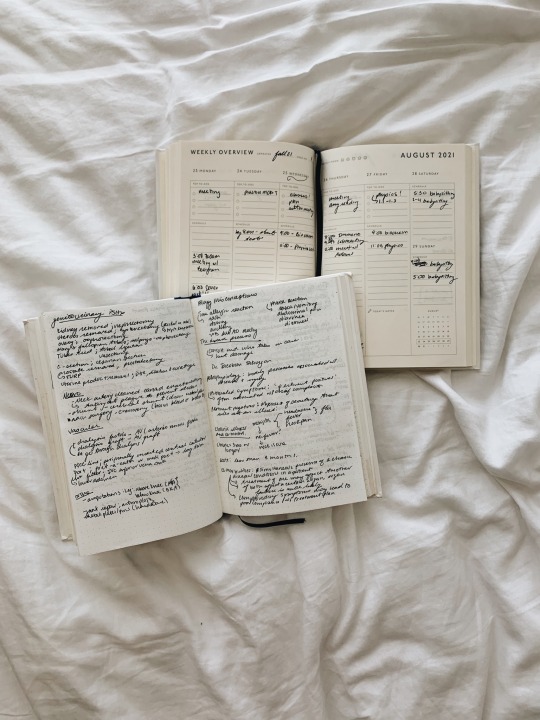
Good afternoon loves!
Classes started for me yesterday, and while it’s SO good to be back in the classroom I’m definitely feeling a bit overwhelmed. Here’s to getting in a new routine!
2K notes
·
View notes
Text
Famous sayings #1
À bon chat bon rat (To good cat good rat) : train cats to hunt rats and they’ll become great rat hunters but the rats great cat avoiders as well
À coeur vaillant, rien d’impossible (To a brave heart, nothing’s impossible)
À la guerre comme à la guerre (To the war like to the war) : when you’re In need, use whatever you can find and don’t expect help
Après la pluie le beau temps (After rain comes fine weather)
Après l’effort le réconfort (After effort comes solace) : you deserve a treat after working hard
Au royaume des aveugles, les borgnes sont rois (In the kingdom of the blinds, the one-eyed are kings)
Aux grands maux les grands remèdes (To big problems big solutions)
Ce n’est pas à un vieux singe qu’on apprend à faire la grimace (You don’t teach old monkeys to make funny faces) : elders know better than you
Ce n’est pas tombé dans l’oreille d’un sourd (It didn’t fall in a deaf man’s ear) : I’m happy/intrigued/excited about what you said
C’est dans les vieux pots qu’on fait les meilleures soupes (It’s in the old pots we make the best soups) : the old methods are often the best
C’est en forgeant qu’on devient forgeron (Forging makes you a blacksmith) : you have to practice to become a pro
C’est l’hôpital qui se fout de la charité (That’s hospitals mocking charity) : don’t speak ill of someone about something you do too
Chassez le naturel, il revient au galop (Chase away nature and it’ll be back at full speed)
Coeur qui soupire n’a pas ce qu’il désire (Sighing heart doesn’t have what it wants)
comme le nez au milieu de la figure (Like the nose in the middle of the face) : about something obvious
Faute avouée à moitié pardonnée (Confessed mistake half forgiven)
Il faut battre le fer tant qu’il est chaud (Strike while the iron’s hot)
Other sayings posts

2K notes
·
View notes
Note
Hi mom I'm starting uni in the fall and will live by myself for the first time ever loll!! Excited but scared, what essentials do you think I should buy? I'll be in a studio X
Hi dear,
Congrats!
Amongst my essentials are a folding steamer basket (fantastic to quickly cook vegetables), microfiber cloths, a spray mop, white vinegar + bicarbonate soda, a good kitchen knife, cutting board, long handle dish brush (strong ally when it's cold), strainer, scissors, handheld vacuum, and some superglue. Get earplugs and a sleeping mask in case of turbulent neighbours.
If you don't have a washer and ever run out of clothes, get a plastic container that fits in the shower, dump your laundry, detergent, and leave it - stir a bit after an hour. Rinse, wring, stick a hanger on the faucet, hang, you're welcome.
If you don't have a lot of storage, get sturdy, neutral, flat bins, with a lid, that fit under the bed; you'll buy fancy furniture later (you don't know when/where you'll move, if you'll ever study abroad, how your preferences will evolve, etc.).
Make sure you never run out of tp, toothpaste, soap, shampoo, bin bags, chargers, and painkillers. Anything else can wait.
Then, depending on your location, a heater and/or fan. If your region suffers catastrophic weather (floods, heatwave, etc.), get 1/ a bag of essentials if you ever have to leave the place in a hurry (clothes, shoes, PJs, meds, toothbrush, chargers, cash, etc.) and 2/ anything you might need if there's ever an issue - lockdown, power failure, winter storm like in Texas in February, etc. (canned food, water bottles, a big blanket, torch, etc). Avoid storing your belongings on the floor, or put them in closed bins.
Outside, I would recommend you add a torch, a small knife, and a personal alarm to your keychain. Better safe than sorry.
Invest in a good mattress and nice pillows. When I was 18, I lived in a super cheap furnished studio, and the mattress was about two phalanges thick. One morning, about two months in, I woke up and started sobbing. My enraged father appeared an hour later with a mattress topper. Don't take the bet. Once your back is demolished, you can't undo the damage - manage, reduce, sure, but not undo. This body is your house forever.
Make your life easier and implement any lazy girl tip you hear about. Ex: use the steamer to cook a whole head of cauliflower, shove it in tubs, in the freezer, and you'll have vegetables for at least a week. It's your time to have fun, meet people and enjoy your independence, not to cook for 45 minutes twice a day.
And, if I may, my own "How to adult" resources.
Love,
Mum
147 notes
·
View notes
Text
Internet French
As promised, some keyboard slang (we stole a lot from you)(sue us). I wrote what is accurate at the moment, a few years ago it was quite popular to write lik this m8 but it became pretty unhip (I could tell you that you can type “aussi” (: too, as well) “O6″ but literally no one has done that since 2008) most people write normally and add some of the following words :
Basics :
jpp (je n’en peux plus) : I can’t stand it anymore i.e. I’m dying from the lols/I’m so tired of this fucking shit
osef (on s’en fout) : no one cares
mdr (mort-e de rire) / ptdr (pété-e de rire) : lol
cmb / ctb (comme ma bite/comme ta bite) “like my dick/like your dick” : easy punchline to almost anything, ex : ‘the line was so long!’ ‘cmb’ ‘you have a short memory’ (tu as la mémoire courte) ‘ctb’
cmt (comment) : how / cmb (combien) : how much/many
slt (salut) / bjr (bonjour) / bsr (bonsoir) : hello
bn (bonne nuit) : good night
bcp (beaucoup) : a lot, much, many / tp (trop) : too, too much
mtnt (maintenant) : now / ajd (aujourd’hui) : today / jms (jamais) : never
srtt (surtout) : especially, above all / vrmt (vraiment) : really
jsp (je ne sais pas) : I don’t know / ms (mais) but
pr (pour) : for / pcq / pq (parce que) : because
pq / pk (pourquoi) : why
ss (sans) : without OR (sous) : under / sr (sur) : over, on
tt (tout) : all, everything OR (tant) : so much, as long
mn (mon) : my (m) / tn (ton) : your (m) / sn (son) : his/her
ns (nous) : we OR (nos) : ours / vs (vous) : you (pl) OR (vos) yours (pl) / lr (leur(s)) : their / theirs
fr (faire) : to do, make
tmtc (toi-même tu sais) : you know what I’m talking about, private joke
tkt / tqt (ne t’inquiète pas) : don’t worry
c (c’est) : it is OR (sais/sait) : know (½/3p sg) / ct (c’était) : it was
d (des) : some, ex : mange des chips / t (tes) : your (pl for one person)
h (heure) : time/hour, ex : on se voit à ql h? (at what time do we meet?)
keske (qu’est-ce que) : what is, ex : qu’est-ce c’est?
kesta (qu’est-ce que tu as) : what’s up/wrong with you?
ke / q (que) : that/what, ex : ke ve tu? (what do you want?)
ql / kel (quel(s)/quelle(s)) : what/which
askip (à ce qu’il paraît) : from what I’ve heard, apparently…
oklm (au calme) : relaxed, calm, ex : petite soirée oklm
Borrowing to english or kids :
go : to leave (j’y go)
dodo (beddy byes) : to sleep, sleeping (je vais dodo)
miam (aka “yum”) : to eat (je vais miam)
lol, the legendary
chiller : to go somewhere and not do shit
fat : something big/amazing, ex : cette soirée est trop fat!
Dropping the vowels :
It’s hard to explain but since so many words in french contain “ou”, “an”, “ai” or “on” (…), when we need or want to make verbs (or possessive pronouns as we have already seen) smaller, we drop those letters and the other person guesses what’s missing regarding the context.
A few examples (but you can play with lots of other verbs) :
vx / vt (veux/veut) : to want, ½/3psg, ex : tu vx d pom? je ss o magasin (do you want apples? I’m at the store) ; (voit) : to see, meet, 3psg
ss / st (sais/sait) : to know, ½/3psg ; (suis/suit) : to follow, ½/3psg ; (suis/sont) : to be 1psg+3ppl, ex : où st t chats? (where are your cats?)
cns (connais) : to know someone, 1p sg
pvs (pouvons) : to can, be able/allowed to, 1p pl

Please note : I have used 1/2/3psg or pl several times in that post, if you have doubts it means that those forms are the conjugated forms - Reminder : je / tu / il-elle-on (singulier) ; nous / vous / ils-elles (pluriel).
3K notes
·
View notes